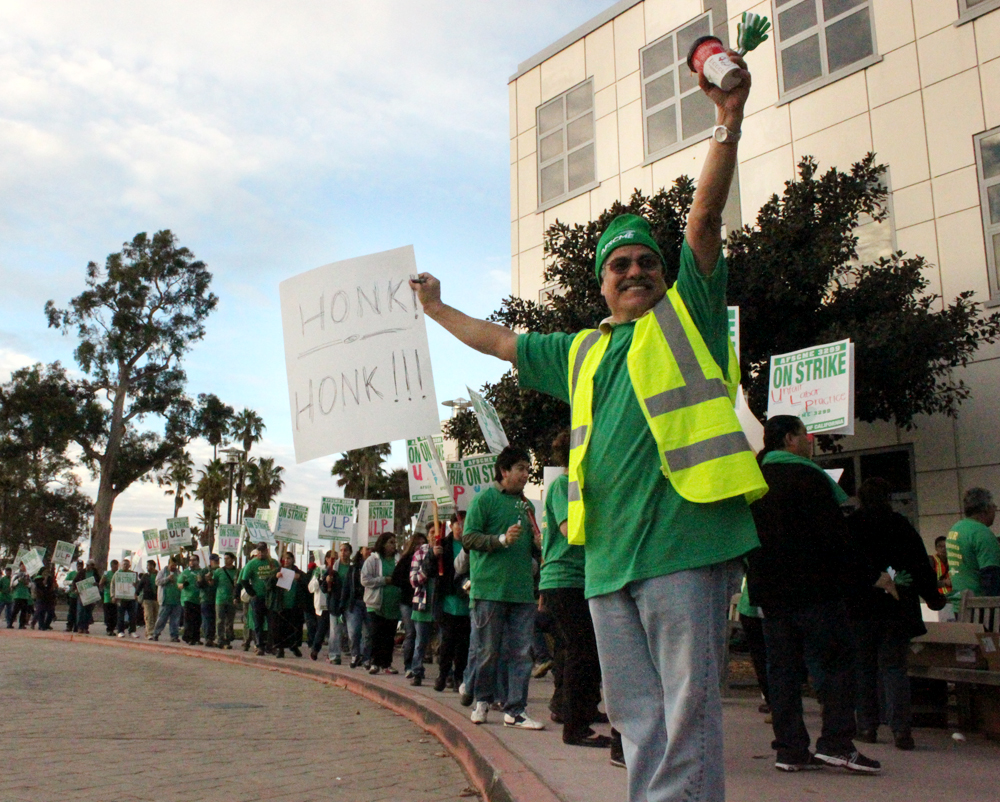
Arturo Samaniego
National Beat Reporter
Labor unions across the nation and here at UCSB may soon see their ability to impose dues upon workers upended in an upcoming Supreme Court case, Janus v. AFSCME.
The case, which began hearing arguments on Feb. 26, deals with whether government employees’ First Amendment rights are violated by fees levied by unions for representing them in collective bargaining.
Daniel Lazar, a Ph.D candidate in electrical engineering and head steward for UC Student-Workers Union 2865 (UAW), said that the case is a “clean cut attack on public unions.”
UAW represents over 16,000 student workers across the University of California system including TAs, tutors, and readers. Here at UCSB, the union represents about a little over 1,500 workers.
“This case has the potential to cause a big hit on our operating budget,” Lazar said in regards to the loss in fees the case could incur, if SCOTUS rules that union dues are a violation of the First Amendment.
The argument that union dues violate the First Amendment stems from some individuals not desiring the fees they pay to go towards supporting union stances they may disagree with.
Michael Kile, a fifth year chemical engineering major and intern at AFSCME, claims that the case threatens to severely weaken unions and may cause many of them “to disappear from the face of the earth.”
Kile said that the case will lead to a decrease in the amount of workers paying union dues. He explains that unions that only have a small amount of members paying dues will have trouble hiring organizers, lawyers, and other personnel to fight for the wages and rights of workers.
The case was brought to the Court by Mark Janus, a child support specialist for the state of Illinois. As stated in a New York Times article, Janus argues that fees imposed by AFSCME violate his First Amendment rights since he does not agree with all the stances the union supports through funds gathered from workers’ dues.
In regards to disagreeing with stances taken by unions, Kile said that he himself does not always degree with the actions of AFSCME, but notes that union members have the opportunity to vote and express their views on the actions of their unions.
“What Janus should be doing is organizing for a different union or drop the union,” Kile said.
The case has the potential to overturn an earlier SCOTUS ruling on union fees decided back in 1977. In Abode v. Detroit Board of Education, the Court ruled that fees imposed by unions to support collective bargaining efforts for all workers did not violate workers’ first amendment rights.
Sharod Shanker, a Ph.D student in electrical engineering and a general member of UAW who pays dues, refuted the notion that fees imposed on workers violate First Amendment rights. Shanker said that fees enable unions to fight for the right of workers, and unions give “voice to the voiceless.”
Both Lazar and Shankar express worry that the loss of fees may impede UAW’s attempts to build upon gains made in regards to same sex bathrooms, sanctuary campus reform, and other efforts. Still, both express optimism that the case has the potential to stir up activism among union members and workers in general for collective bargaining.
Kile warns that any undergraduate who desires to go onto graduate school should be worried about this case, as graduate students often serve as TAs. In that capacity, unions protect TAs’ rights and fight for needs like housing
“In a post-Janus v. AFSCME world, you may not have a union to be in,” Kile said.
Kile said that the case will most likely result in union fees being deemed unconstitutional. He said that with the appointment of Neil Gorsuch the Court is now ideologically tilted towards conservatism that often runs against the rights of unions.
Both Kile and Lazar said their unions have taken steps to prepare for the worst, making sure their finances (in the case of union dues being ruled unconstitutional) are still consistent enough to ensure that they can keep fighting for the rights and wages of their members.
“As we approach a post-Janus v. AFSCME world and as privatization gets empowered due to the decline of unions, we will all suffer for it regardless of our position or whether we decide to go to graduate school or not,” Kile said.











RKV, political contributions only come from union dues, which are contributed by people who have made the decision to join the union, not fair share fees, which are contributed by all workers representing the union.
Also, unions are the only way the student-workers can have any democratic voice in the running of the UC, and have a proven track record of winning important protections like workplace safety and healthcare benefits.
Our union is run democratically, so any member can come to meetings, run for office, go to organizing meetings, and vote on our union priorities.
Daniel, I know unions. There is little you can tell me about them given my years of working in a unionized environment. As to fair share fees, you are at the mercy of your otherwise dues paying members if you attempt to go that way. Sorry. No sale. And students (union members or not) should have no more say than their vote for politicians in how the UC is run.
Comments are closed.